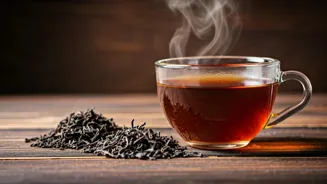Tea's Grand Origin
Black tea, a beloved beverage globally, emerges from the Camellia sinensis plant, the same source as green tea. However, the processing methods dictate
their final characteristics. Black tea undergoes full oxidation, which imparts its characteristic dark color and robust flavor profile. The tea leaves are initially withered, then rolled or cut to break cell walls, which exposes enzymes to air, initiating the oxidation process. This is unlike green tea, where oxidation is either prevented or kept to a minimum through techniques like steaming or pan-firing. The oxidation process is crucial, as it alters the chemical composition of the leaves, changing the flavor, color, and also the potential health benefits, making black tea distinct from its green counterpart.
Benefits for Hair
Black tea offers many potential benefits for hair. It is rich in antioxidants, such as theaflavins and thearubigins, which can help protect hair from damage caused by environmental stressors like pollution and UV radiation. Additionally, black tea contains caffeine, which may stimulate hair follicles, enhancing hair growth. The tannins in black tea can impart a natural shine and luster to the hair, and the tea's ability to darken hair makes it useful for concealing grey hairs, making the strands look more vibrant. Black tea may also reduce hair fall by strengthening the hair shaft and promoting a healthy scalp. These properties, when used correctly, can contribute to a fuller and more vibrant head of hair.
Using Black Tea
Incorporating black tea into your hair care routine is relatively simple and can be done in a few ways. One popular method involves brewing strong black tea and letting it cool. This tea can then be used as a hair rinse after shampooing and conditioning. Simply pour the tea over your hair, massage it into the scalp, and leave it for a few minutes before rinsing with water. Black tea can also be added to hair masks, combining the brewed tea with other beneficial ingredients like honey, yogurt, or essential oils. The tea rinse can be used one or two times a week, depending on hair needs and reactions. It is important to perform a patch test before a full application to rule out any allergic reaction.
Green Tea Comparison
Both green and black tea are derived from the Camellia sinensis plant, but their processing gives them different properties. Green tea is celebrated for its high antioxidant content, potentially offering benefits like improved scalp health and reduced hair fall. While green tea is less oxidized, it retains more of its natural compounds. Black tea, owing to its full oxidation, has more theaflavins and thearubigins, which have potent antioxidant properties, which are good for hair health. Ultimately, both teas have properties that support hair growth and health. The best choice hinges on personal preferences and the desired outcomes for hair care, such as colour enhancement, or the need to reduce hair fall.













